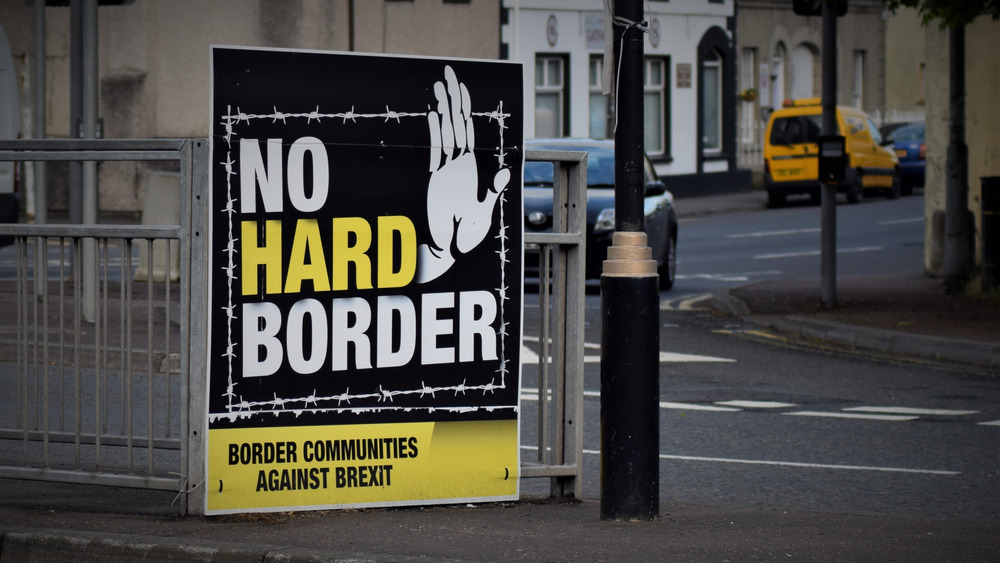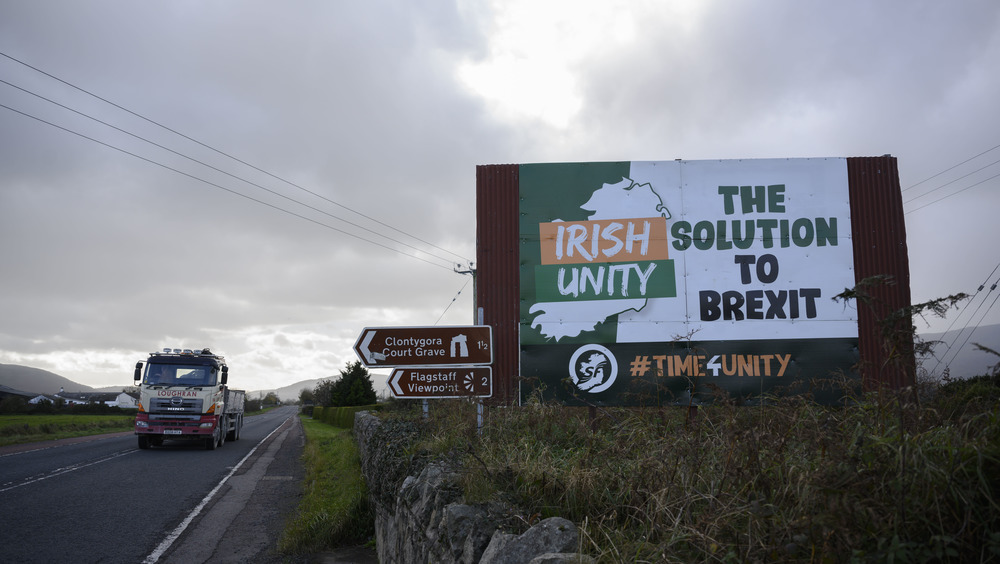What Will Brexit Mean For Northern Ireland?
The United Kingdom's Brexit agenda has generally been greeted with bafflement and derision from the country's allies around the world. Domestically, though, the UK leaving the European Union has generally been supported by a solid and vocal portion of the voting public. Hence, after four years of wrangling, the nation severed ties with the EU and struck a trade agreement that formalized the end of the Brexit "transition period" on December 31, 2020. From then on, the UK was on its own. But the reality is that Brexit is nothing like the clean break that many of its supporters purport it to be, with one issue muddying the waters of the withdrawal agreement more than any other: The UK's future relationship with the Republic of Ireland, for whom Brexit poses "huge challenges," according to DW.
After the Anglo-Irish Treaty of 1921 which ensured self-governance for the island of Ireland, the loyalist counties in the Northeast voted to remain a part of the UK, leading to the partition of Ireland as we know it today, with the Republic to the south and northwest, and Northern Ireland, which is presently a constituent unit of the UK. But in the century since, the story of the island's two nations has been far from harmonious, with the Northern Ireland Conflict, or "Troubles," that took the lives of 3,532 people, according to the Sutton Index of Deaths.
In 1998, The Good Friday Agreement was struck, a landmark moment in the Northern Irish peace process that directly contributed to the sharp decrease in hostilities.
'No hard border on the island of Ireland'
It ended the conflict that had plagued the island for more than 30 years. The treaty was hailed as a great success by the international community.
One aspect of the Agreement would become an enormous sticking point in the Brexit negotiations: the stipulation that there should never again be a hard border on the island of Ireland, according to the guiding principles as published by the European Commission.
Even before the Brexit referendum of 2016, politicians on both sides of the debate, as well as public figures from both Northern Ireland and the Republic, have been adamant that no form of Brexit should ever necessitate the re-emergence of a land border between the two countries, which would run the risk of further violence and lead to the return of the Troubles. "If we get this wrong we could drift back to almost a paramilitary style of policing," warned the chief constable of the Northern Irish police, according to Channel 4. As a result, the UK and EU have thrashed out a complicated new arrangement in which Northern Ireland remains part of the European single market, allowing for frictionless trade and movement with the Republic while, per the BBC, the UK undertakes customs checks between the island of Ireland and Great Britain, placing a border in its own waters, along the Irish Sea.
Though the new arrangement has been hailed as a compromise, Northern Irish Unionists have previously condemned the Irish Sea border plan as "absurd" and "unconstitutional," per the BBC.
The prospect of a united Ireland
Though we might expect Unionists to be against the idea of a sea border between Northern Ireland and Great Britain on general principle, the border also presents a very real existential threat in that it may well be the precursor to the one thing Unionists historically oppose: the unification of Ireland. Many commentators argue that the realization of Brexit has meant that the chances of a united island of Ireland have increased dramatically, more likely than at any time in living memory.
Lord David Blunkett, a British peer who served as the UK's Home Secretary at the time that Tony Blair's Labour government was negotiating the Good Friday Agreement, has called Brexit a "disaster," according to Irish News, and forecasts that the UK's withdrawal from the European Union will be successfully leveraged by those parts of the UK seeking to sever ties with the Westminster Parliament.
Per Irish News, Blunkett has stated: "I believe that this deal actually accelerates the possibility within the next 25 years of a united island of Ireland. It's a century since the 1921 legislation as part of the agreement on partition. A century later, we're faced with the contradictions that exist in terms of Northern Ireland and its relationship with the European Union, and the contradictions that therefore are accorded to its relationship with the rest of Great Britain."
Blunkett argued that the consequences of Brexit "bode extremely ill for the future," putting the UK as a union of four nations in doubt.


